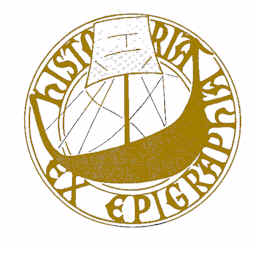
The Epigraphic Society

|
The Epigraphic Society
|
|
|
COMMENTS ON A SCHOLASTIC OGHAM INSCRIPTION FROM SCOTLAND Donal Buchanan (from his Scholastic Ogham Database, a work in progress) Below is a two-line inscription in what is often called "Pictish Ogham," but which I prefer to call "Scholastic Ogham." It is on an inscribed bone knife-handle found in 1931 during the excavation of Gurness Broch, Aikerness, Orkney. Both lines are given below. Inscription: Cognate Lang: Inna eáca monni. Mat-s. Translation: To perform the bringing forth of a man. Belonging to Mattie (Maud). MacAlister got INEITTEMON...MATS... and restored it: INEITTEM-ON MATS[...EN?] = "Of Mats...his ineittem" (whatever that tool might have been). Anthony Jackson recorded it as INEICTSMQUU EaM?CDE. Padel read it as INEITTEM(which he considered quite clear)EN M(A or O)TS. One of four readings suggested by Forsyth was IN(e/c)IT( /a)TEM (o/om/ob/u/e/?)N( /.)MATS. Buchanan: I saw: INEI[CC!]EM[O]N MATS = Inna eáca monni. Mats. = To perform the bringing forth of a man. Belonging to Mattie (Maud). This knife apparently belonged to a midwife who used it to cut the cord at births. Note the pun between the Old Norse Inna = to do, perform and the AS Inna = the womb. No doubt the Old Norse Inn = within carried the same sense as AS Inna. The Old German feminine name Mathild(is) (Mathilda) = mighty in battle (Du/G286Aff), was introduced into the British Isles in the 11th century by the wife of William the Conqueror. Note that the name MAT (in the possessive with S) is set off as important by a small "x." The normal spoken form of the name seems to have been Maud, but there could have been a form analagous to the known pet form for Matilda = Mattie. The appearance of this name suggests a date for this artifact of a time in the latter part of the 11th century. Here we have evidence that the Scots were already showing the demographics we see today: a Celtic people whose language has been strongly influenced by Anglo Saxon, Old Norse and even Norman French. Vocabulary: ON Inna = to do, perform (V314A). AS Inna = the womb (B594B). AS Eáca -an = an addition, an eking, increase (B224A). Eácnian = to increase, to become pregnant, to bring forth (B224A). AS Mann (Monn) = man, human being of either sex (B668B). MATS = poss. of MAT = ON Mattr = might, strength (V419A).
|
Send mail to donalbb@epigraphy.org
with
questions or comments about this web site.
|